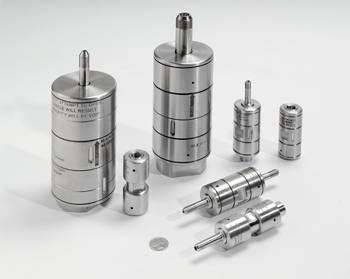Cell lysis techniques: how do you perform yours?
There are many possible options for how to complete this key vaccine production step.
However, not all cell lysis/cell disruption methods are created equal, with each one creating varying properties in the end product.
Manufacturers aim to achieve efficient cell lysis and maximum protein release, while avoiding damage to cells through temperature or pressure-related denaturization.
Typical cell processing methods at the lab scale such as French Press, freeze-thawing, mortar and pestle, and ultrasonication do achieve some of these goals, but these methods have their drawbacks.
While helpful for single or small-scale applications, they seldom check all the boxes needed for optimum cell lysis, with common issues being high energy consumption and low scalability.
Cell lysis using High-Pressure Homogenizers
High-Pressure Homogenizers (HPH) are a common alternative to freeze-thawing and detergents for cell lysis. Although useful in the lab, these complex devices are less efficient when processing large batches, with wastage of usable product in the final suspension due to an inconsistent pressure profile.
What’s more, with a great number of intricate technical components in the machine, they require specialist knowledge to clean and maintain them properly.
Microfluidics processors provide a solution to these issues. As the gold standard in cell lysis, they retain the benefits of a high-pressure homogenizer while also providing a valuable increase in the proportion of usable particles recovered.
Microfluidizer® Processors
Microfluidics equipment uses less energy than a traditional HPH and is user-friendly, easy to maintain, and swift at processing.
The efficient cooling process also leads to less wastage and high protein recovery.
The crucial component in our superior machines is the fixed-geometry Interaction Chamber™. In these chambers, the processed material is forced through microchannels (75-100 microns in nominal dimension) at constant, high pressures, causing each cell to receive the same treatment when being lysed.
The consistent, repeatable lysis is easily scaled from lab to production by simply increasing the number of microchannels on your processor.
Microfluidizer® technology can operate at a range of temperatures and pressures to lyse any kind of cell, from softer mammalian cells to the toughest yeast cells.
Introducing Microlyser™ Technology
To further assist in efficiently achieving optimum cell disruption solutions, Microfluidics recently introduced the MP350 Microlyser™ Processor to address many of the challenges faced with large volume cell disruption manufacturing for the biopharma industry. Capitalizing on the success of Microfluidizer® processing, the Microlyser™ technology utilizes both Microfluidics proprietary Interaction Chamber™ with a sanitary pumping system to create an innovative solution for production scale results. While providing industry-leading pressure up to 30,000 PSI (2068 bar), this production scale equipment maximizes yields, achieves consistent shear rates and produces repeatable results batch-to-batch. This biopharma enhance machine is specially designed to meet cGMP requirements and has Steam In Place (SIP) capabilities.
Microfluidics Cell Disruption Advantage
Whether achieving lab scale or production scale results, Microfluidics has a cell disruption solution for you. Our expert technical team can help you match the required pressure to the cell type you wish to lyse. For further guidance on cell lysis please visit our resource page.
Download our Cell lysis applications note today and discover:
- An overview of methods used for cell lysis
- Data from cell lysis studies using our processors
- Tips for optimizing your cell lysis process
Topics:
Cell Disruption

